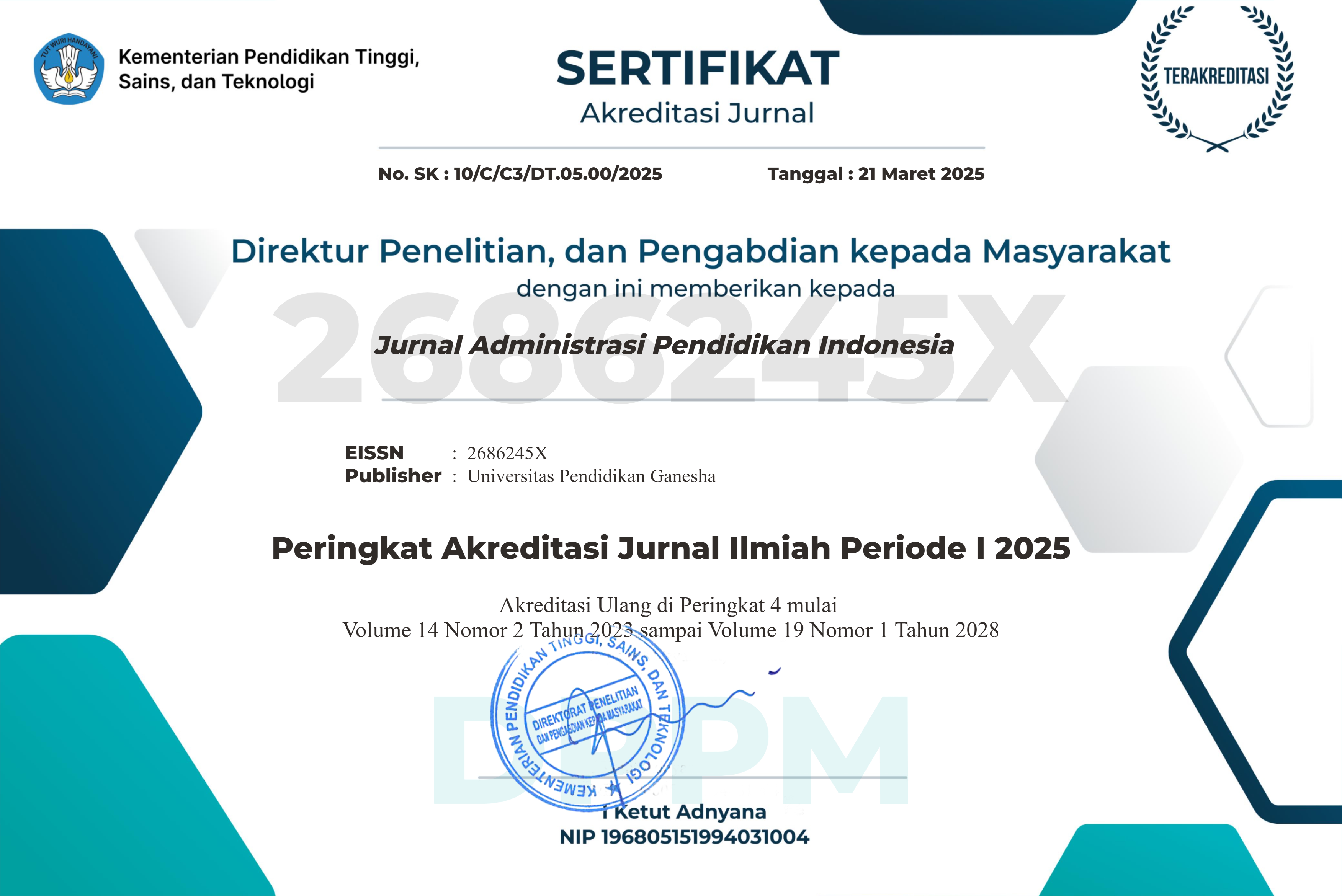Teachers' Self-Management in Improving Students' Learning Motivation at SMA Negeri 1 Kuta Utara
DOI:
https://doi.org/10.23887/jurnal_ap.v13i2.1741Keywords:
self-management, driving teachers, learning motivationAbstract
This study aims to describe the self-management of driving teachers in increasing students' learning motivation at SMA Negeri 1 Kuta Utara. This study uses a qualitative descriptive research method to determine the phenomena in the field related to the self-management of driving teachers so that the information obtained is factual and accurate. The population of this study was the driving force teachers at SMAN 1 Kuta Utara, the sample used in this study was purposive sampling. Methods of data collection using observation, interviews, and primary and secondary data documentation. Data analysis techniques were carried out until the data was saturated, that is, if there was no other information or it was the same, both the data from the same informant and different informants. The research results show that; 1) Motivator teacher self-management increases student learning motivation by knowing the purpose of work as an educator, namely not only by educating but also building character, guiding students' nature, interests, and talents, 2) Motivating teacher self-management increases student learning motivation students by carrying out self-development through education and training (training), reading books and journals literacy, and increasing competence in the field of technology, 3) Self-management of driving teachers increases student learning motivation by cultivating emotional intelligence through self-soothing activities before starting learning in class and also take a personal approach for students who have problems in learning, 4) Self-management of the driving teacher increases student learning motivation by managing time through making time lists and using group methods in the defense process horse.
References
Afni, N., & Jumrah, abrina M. (2019). Pengaruh Kecerdasan Emosional Guru Terhadap Manajemen Kelas Siswa di SDN Panaikang 1 Kota Makassar. Dikdas Matappa: Jurnal Ilmu Pendidikan Dasar, 2(2), 279–286. https://www.researchgate.net/publication /339126783_Pengaruh_Motivasi_Belajar_Terhadap_Ketuntasan_Belajar_Sains_Melalui_Pelaksanaan_Program_Pembelajaran_Retrieval_Remedial_Murid_Sd_Di_Kota_Makassar
Andriani, R., & Rasto, R. (2019). Motivasi belajar sebagai determinan hasil belajar siswa. Jurnal Pendidikan Manajemen Perkantoran, 4(1), 80. https://doi.org/10.17509/jpm.v4i1.14958
Damanik, B. E. (2018). Pengaruh Motivasi dan Pengembangan Diri Terhadap Prestasi Kerja Dosen. Jurnal EK & BI Politeknik Bisnis Indonesia, 1(2), 11–21. http://jurnal.murnisadar.ac.id/index.php/EKBI/article/view/42
Dewi, W. C. (2019). Kontribusi Manajemen Waktu, Lingkungan di Rumah, dan Motivasi Siswa Terhadap Prestasi Belajar Siswa SMK. Media Manajemen Pendidikan, 2(2), 300. https://doi.org/10.30738/mmp.v2i2.4908
Emda, A. (2017). Motivasi Pembelajaran Perspektif Guru dan Siswa. Lantanida, 5(2), 93–196. https://jurnal.ar-raniry.ac.id/index.php/lantanida/article/download/2838/2064
Helaludin, & Wijaya, H. (2019). Analisis Data Kualitatif Sebuah Tinjauan Teori dan Praktik. Makassar: Sekolah Tinggi Theologia Jaffray.Online e-Book. https://www.google.co.id/books/edition/Analisis_Data_Kualitatif_Sebuah_Tinjauan/lf7ADwAAQBAJ?hl=id&gbpv=1&dq=analisis+data&printsec=frontcover
Kemdikbud, R. (2022). Merdeka Belajar Episode 19: Rapor Pendidikan Indonesia. Youtube. https://www.youtube.com/watch?v=NbD96YWKh84
Maitrianti, C. (2021). Hubungan Antara Kecerdasan Intrapersonal Dengan Kecerdasan Emosional. Jurnal MUDARRISUNA: Media Kajian Pendidikan Agama Islam, 11(2), 291–305. https://jurnal.ar-raniry.ac.id/index.php/mudarrisuna/article/view/8709
Nurwijaya, S. (2019). Hubungan Manajemen Diri Dengan Prestasi Belajar Matematika Siswa Kelas Viii Smp Negeri 3 Watampone Kabupaten Bone. DIDAKTIKA : Jurnal Kependidikan, 12(1), 88–102. https://doi.org/10.30863/didaktika.v12i1.178
OECD. (2019). PISA 2018 Assessment and Analytical Framework PISA. Paris: OECD Publishing.
Pasaribu, V. L. D., Elburdah, R. P., Sudarso, E., & Fauziah, G. (2020). Penggunaan Manajemen Waktu Terhadap Peningkatan Prestasi Belajar Di Smp Araisiyah. Jurnal ABDIMAS Tri Dharma Manajemen, 1(1), 84. https://doi.org/10.32493/abmas.v1i1.p84-91.y2019
Prasetya, A. F., & Sonny, G. I. M. (2018). Mengelola Emosi. Yogyakarta: K- Media.
Ratnasari, S. L., Supardi, S., & Nasrul, H. W. (2020). Kecerdasan Intelektual, Kecerdasan Emosional, Kecerdasan Spiritual, Dan Kecerdasan Linguistik Terhadap Kinerja Karyawan. Journal of Applied Business Administration, 4(2), 98–107. https://doi.org/10.30871/jaba.v4i2.1981
Sari, L. N. (2018). Pengaruh Manajemen Diri Dan Kontrol Diri Terhadap Kemandirian Belajar. Jurnal Pendidikan Guru Sekolah Dasar, 5(2), 1–12. https://journal.student.uny.ac.id/ojs/index.php/pgsd/article/view/14009
Sunu, I. G. K. A. (2015). Manajemen Kelas. Singaraja: Media Akademi.
Surur, A. M., & Nadhirin, A. U. (2020). Manajemen Waktu Pembelajaran Daring Di Masa Pandemi Covid-19 Pada TK Dharma Wanita 1 Baleturi. As-Sibyan: Jurnal Pendidikan Anak Usia Dini, 5(2), 81–94. http://jurnal.uinbanten.ac.id/index.php/ass ibyan/article/view/2939











